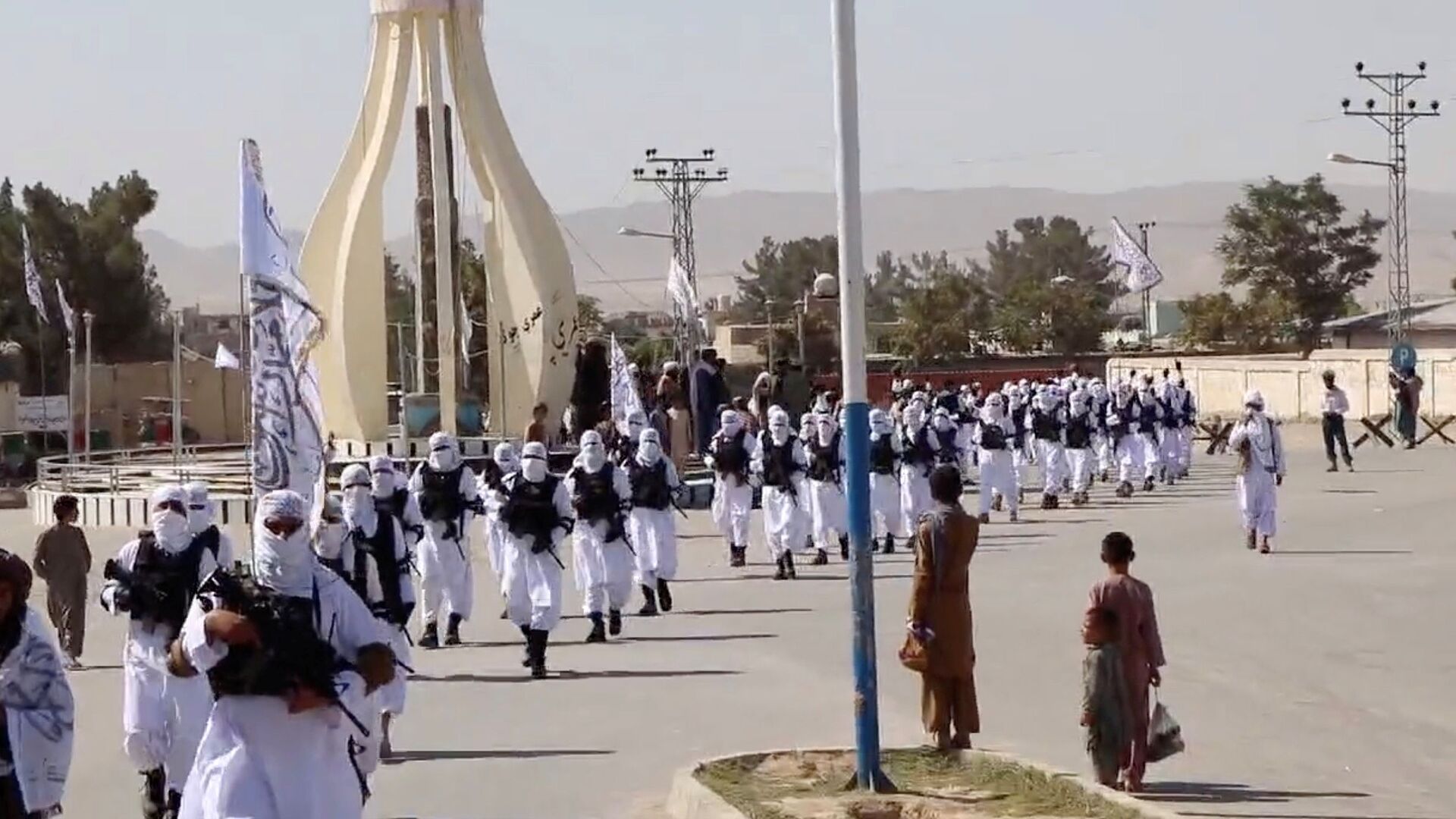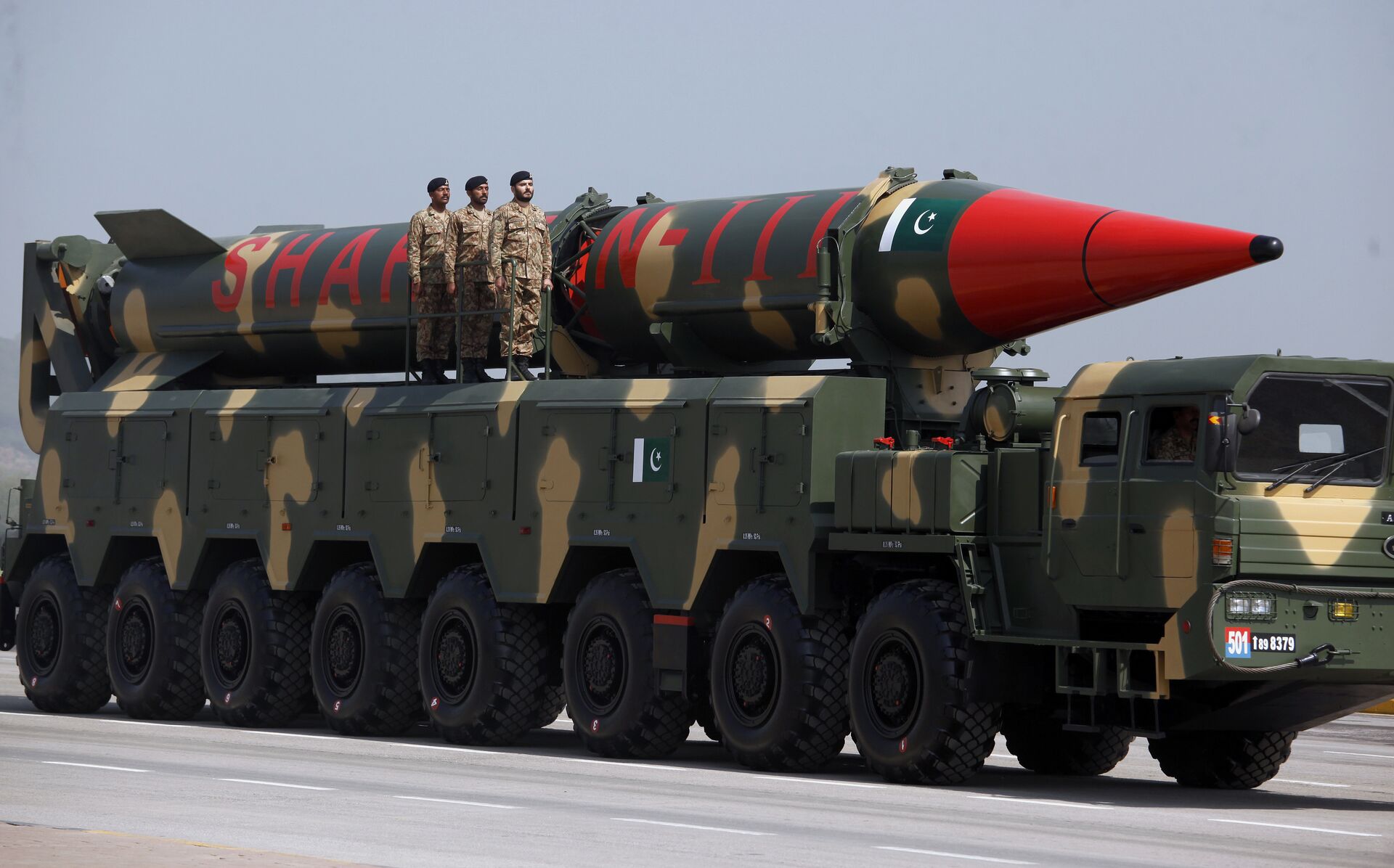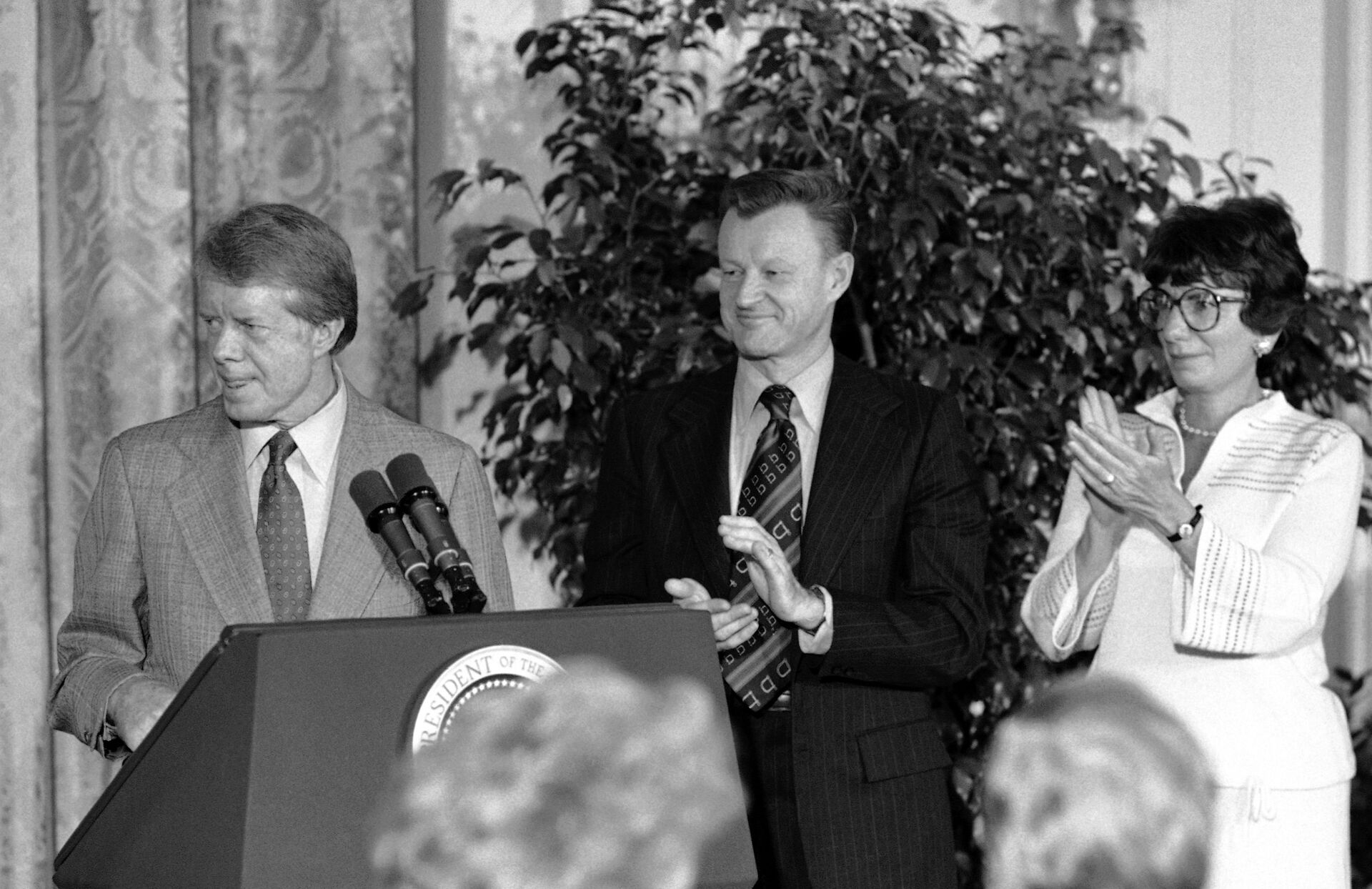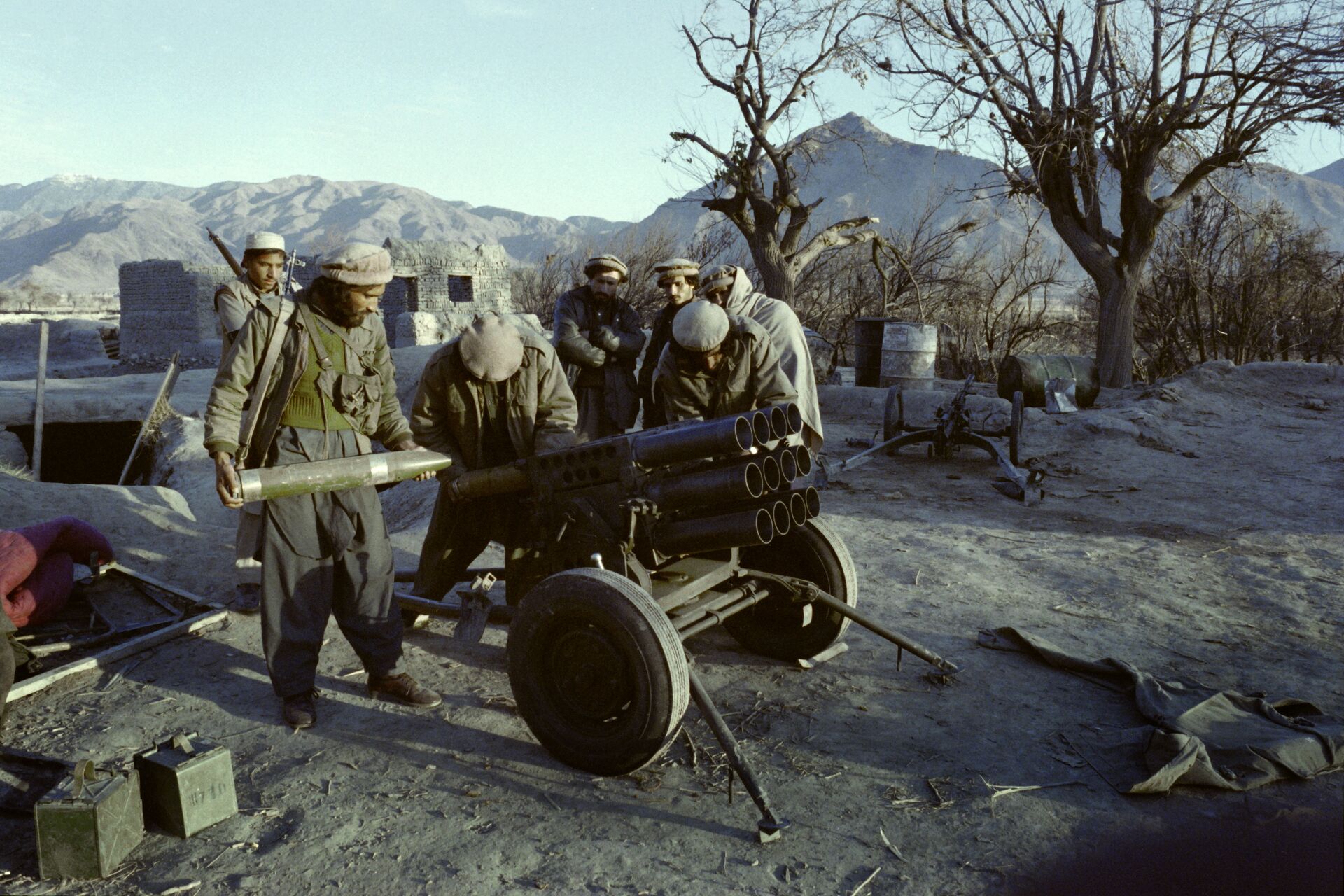https://sputnikglobe.com/20210908/why-taliban-should-thank-us-not-only-for-billions-worth-of-weapons-but-also-for-nuclear-pakistan-1088885576.html
Why Taliban Should Thank US Not Only for Billions’ Worth of Weapons, But Also for Nuclear Pakistan
Why Taliban Should Thank US Not Only for Billions’ Worth of Weapons, But Also for Nuclear Pakistan
Sputnik International
The Taliban* have managed to lay their hands on billions’ worth of sophisticated Western-made weapons amid the hurried retreat of the Afghan National Army... 08.09.2021, Sputnik International
2021-09-08T15:40+0000
2021-09-08T15:40+0000
2023-07-31T16:52+0000
afghanistan
pakistan
central asia
zbigniew brzezinski
central intelligence agency (cia)
afghan mujahadeen
taliban
cold war
ussr
afghanistan war
https://cdn1.img.sputnikglobe.com/img/07e5/08/18/1083704809_33:0:2479:1376_1920x0_80_0_0_27b5cdac6b6c79e87406acdd863e5305.jpg
Col. Richard Kemp, a former British commander, on 16 August raised the red flag over the possibility of Taliban elements one day seizing nuclear materials and technology from Pakistan. These concerns were also shared by former National Security Adviser John Bolton in his 23 August op-ed for The Washington Post. The next day, a group of American lawmakers sent a letter to Joe Biden asking the president: "Do you have a plan to ensure that Afghanistan, under Taliban occupation, will never acquire a nuclear weapon?"How US Turned Blind Eye to Pakistan's Nuclear Arms ProgrammeWhile the possibility that the Taliban could get access to Pakistani nukes has triggered serious concerns in the US and Europe, American politicians have shied away from discussing how Islamabad emerged as a nuclear power. While Bolton has specifically lambasted Pakistan for "recklessly" pursuing nuclear weapons for decades, newly released documents suggest Washington knew about Islamabad's nuclear bid, but did nothing to stop it.In mid-August 2021, Pakistani President Arif Alvi revealed that the country had developed a "nuclear deterrent" by 1981, long before its 1998 underground atomic tests. In the aftermath of Alvi's remarks, the National Security Archive, a Washington-based non-profit archival institution, released a series of documents shedding light on the US handling of the Pakistan nuclear problem.A US memo dated 28 March 1978 provides the earliest known indication of Washington's recognition of Pakistan's uranium enrichment programme. In June 1978, the CIA document suggested that Pakistan would "probably… be capable of assembling a nuclear device in the early 1980s", adding that the country "will not have a credible nuclear weapons option until at least the mid-1980s".However, in January 1979, US State Department officials admitted that Islamabad was “moving more rapidly toward acquisition of nuclear capability than we had earlier estimated", having learned that Pakistan had initiated a uranium enrichment programme using gas centrifuge technology.The 18 January 1979 State Department memo specifically cited the 1976 Symington Amendment which banned US economic and military assistance to countries illegally transferring or acquiring nuclear enrichment technology. While the memo highlighted that Washington must persuade Pakistan to nix its enrichment and reprocessing programme, it noted that "termination of aid [to Pakistan] would further complicate our position in the turbulent Persian Gulf region" and "would not contribute to achievement of our non-proliferation objectives". As a result, the Jimmy Carter administration turned a blind eye to Pakistan's nuclear development as well as transfer of materials and technologies to Pakistanis by other state and non-state players.The reason behind Washington's unusually soft approach to Islamabad at the time was because the Cold War-era US leadership regarded Pakistan as a bulwark against the Soviet Union and India, the USSR's regional ally, says Bharat Karnad, a national security expert and emeritus professor of National Security Studies at New Delhi's Centre for Policy Research.It is unclear when the CIA actually learned about Islamabad's nuclear programme. However, the first signs of Islamabad's bid to build atomic weapons emerged in the mid-1960s, when Prime Minister of Pakistan Zulfikar Ali Bhutto pledged that the nation would prefer "to eat grass and leaves for a thousand years" in order to create its own nuclear bomb rather than see neighbouring India get one. India's subsequent decision to kick off a nuclear project in 1967 and Islamabad's loss of East Pakistan in 1971's Bangladesh Liberation War prompted Pakistan to accelerate its efforts.The National Security Archive notes that it was Abdul Qadeer Khan, a Belgian-educated metallurgist, who played a crucial role in building Pakistan's enrichment facilities. The engineer had stolen major elements of gas centrifuge technology when he worked in the Netherlands at the uranium firm Urenco in the 1970s. However, the CIA asked the Netherlands in 1975 not to prosecute Khan when he came under suspicion, according to ex-Dutch Prime Minister Ruud Lubbers. The intelligence agency explained that they wanted "to follow and watch Khan to get more information", according to Lubbers. Still, there are still many unknowns with regard to the CIA's efforts to trace Khan's activities, since the intelligence "has declassified next to nothing" concerning the issue, according to the National Security Archive. When the non-profit filed a FOIA for documents from 1978 concerning A. Q. Khan and Pakistani nuclear enrichment activities, the agency took "a neither confirm-nor-deny position that it had any such records".Karnad does not rule out that the CIA was aware of Islamabad's secret nuclear weapons programme. According to him, the US did not prevent the transfer of atomic technologies to Pakistan because they apparently sought to reshuffle "a military balance on the subcontinent" vis-à-vis the USSR and pro-Soviet India, which conducted its first nuclear weapons test in 1974.Could Taliban Get Access to Pakistan's Nukes?Meanwhile, the probability of the Taliban getting access to Islamabad's nuclear secrets and stockpiles has prompted a heated debate among international observers.However, one cannot be one hundred percent sure that the Taliban would never get access to Pakistani nuclear weapons technologies, believes Dr Michele Groppi, teaching fellow of Challenges to the International Order at the Defence Studies Department, King's College London."We have to keep an eye on it", he says. "But I don't think this prospect is particularly worrisome in the short run. In the longer term, however, we have to see".But if the Taliban were to gain access to nuclear arms, this could "really angered China", Groppi believes. According to him, the Afghan insurgents are not interested in upsetting Beijing, at least for now, since they expect that the People's Republic will invest in Afghanistan. Furthermore, the Taliban leadership has already signalled its willingness to participate in the China-led Belt and Road Initiative (BRI)."Vis-à-vis Pakistan, the issue is not about the weapons but the increasing radicalisation of the society", deems Shreyas Deshmukh, research associate with the National Security Program at the Delhi Policy Group, a think tank in New Delhi, India. "Today we can see there is major support coming from lower and middle class of the Pakistani society for the Taliban, and it was there in the late 1990s as well. Therefore the fear of not only the Taliban but any extremist elements getting their hands on nuclear material from Pakistan is real."Deshmukh notes that Tehrik-i-Taliban Pakistan (TTP)*, a terrorist group located on the Afghan-Pakistan border which helped the Taliban to fight against Afghan government forces, carried out several attacks between 2008 and 2015, targeting Pakistani security infrastructures "including a major attack on Mehran Naval Air Base which also holds nuclear assets".In addition to this, Afghanistan lies between four declared nuclear states, the Indian scholar emphasises, suggesting that "if the instability persists in [the Central Asian state] it can be a hub for the black market for nuclear materials".*The Taliban and Tehrik-i-Taliban Pakistan (TTP) are terrorist organisations banned in Russia and many other states.
pakistan
central asia
Sputnik International
feedback@sputniknews.com
+74956456601
MIA „Rosiya Segodnya“
2021
News
en_EN
Sputnik International
feedback@sputniknews.com
+74956456601
MIA „Rosiya Segodnya“
Sputnik International
feedback@sputniknews.com
+74956456601
MIA „Rosiya Segodnya“
pakistan, central asia, zbigniew brzezinski, central intelligence agency (cia), afghan mujahadeen, taliban, cold war, ussr, afghanistan war, opinion, us, nuclear weapons
pakistan, central asia, zbigniew brzezinski, central intelligence agency (cia), afghan mujahadeen, taliban, cold war, ussr, afghanistan war, opinion, us, nuclear weapons
Why Taliban Should Thank US Not Only for Billions’ Worth of Weapons, But Also for Nuclear Pakistan
15:40 GMT 08.09.2021 (Updated: 16:52 GMT 31.07.2023) The Taliban* have managed to lay their hands on billions’ worth of sophisticated Western-made weapons amid the hurried retreat of the Afghan National Army. However, a broader problem cited by American and European military specialists and policymakers is that the Afghan insurgent group may also gain access to military nuclear technologies.
Col. Richard Kemp, a former British commander, on 16 August raised the red flag over the possibility of Taliban elements one day seizing nuclear materials and technology from Pakistan. These concerns were also shared by former National Security Adviser John Bolton in his 23 August op-ed for The Washington Post. The next day, a group of American lawmakers sent a
letter to Joe Biden asking the president: "Do you have a plan to ensure that Afghanistan, under Taliban occupation, will never acquire a nuclear weapon?"
How US Turned Blind Eye to Pakistan's Nuclear Arms Programme
While the possibility that the Taliban could get access to Pakistani nukes has triggered serious concerns in the US and Europe, American politicians have shied away from discussing how Islamabad emerged as a nuclear power. While Bolton has specifically lambasted Pakistan for "recklessly" pursuing nuclear weapons for decades, newly released documents
suggest Washington knew about Islamabad's nuclear bid, but did nothing to stop it.
In mid-August 2021, Pakistani President Arif Alvi revealed that the country had developed a "nuclear deterrent" by 1981, long before its 1998 underground atomic tests. In the aftermath of Alvi's remarks, the National Security Archive, a Washington-based non-profit archival institution, released a series of documents shedding light on the US handling of the Pakistan nuclear problem.
A US
memo dated 28 March 1978 provides the earliest known indication of Washington's recognition of Pakistan's uranium enrichment programme. In June 1978, the CIA document
suggested that Pakistan would "probably… be capable of assembling a nuclear device in the early 1980s", adding that the country "will not have a credible nuclear weapons option until at least the mid-1980s".
However, in January 1979, US State Department officials admitted that Islamabad was “moving more rapidly toward acquisition of nuclear capability than we had earlier estimated", having learned that Pakistan had initiated a uranium enrichment programme using gas centrifuge technology.
The 18 January 1979 State Department
memo specifically cited the 1976 Symington Amendment which banned US economic and military assistance to countries illegally transferring or acquiring nuclear enrichment technology. While the memo highlighted that Washington must persuade Pakistan to nix its enrichment and reprocessing programme, it noted that "termination of aid [to Pakistan] would further complicate our position in the turbulent Persian Gulf region" and "would not contribute to achievement of our non-proliferation objectives". As a result, the Jimmy Carter administration turned a blind eye to Pakistan's nuclear development as well as transfer of materials and technologies to Pakistanis by other state and non-state players.
The reason behind Washington's unusually soft approach to Islamabad at the time was because the Cold War-era US leadership regarded
Pakistan as a bulwark against the Soviet Union and India, the USSR's regional ally, says Bharat Karnad, a national security expert and emeritus professor of National Security Studies at New Delhi's Centre for Policy Research.
"In 1979, Pakistan gained significance as a frontline state, and permitted the US Central Intelligence Agency to join with Pakistan army’s Inter-Services Intelligence to fund and mobilise the Afghan Mujahideen against the Soviet occupation troops in Afghanistan", remarks Karnad.
It is unclear when the CIA actually learned about Islamabad's nuclear programme. However, the first signs of Islamabad's bid to build atomic weapons emerged in the mid-1960s, when Prime Minister of Pakistan Zulfikar Ali Bhutto pledged that the nation would prefer "to eat grass and leaves for a thousand years" in order to create its own nuclear bomb rather than see neighbouring India get one. India's subsequent decision to kick off a nuclear project in 1967 and Islamabad's loss of East Pakistan in 1971's Bangladesh Liberation War prompted Pakistan to accelerate its efforts.
The National Security Archive notes that it was Abdul Qadeer Khan, a Belgian-educated metallurgist, who played a crucial role in building Pakistan's enrichment facilities. The engineer had stolen major elements of gas centrifuge technology when he worked in the Netherlands at the uranium firm Urenco in the 1970s. However, the CIA asked the Netherlands in 1975 not to prosecute Khan when he came under suspicion,
according to ex-Dutch Prime Minister Ruud Lubbers. The intelligence agency explained that they wanted "to follow and watch Khan to get more information", according to Lubbers. Still, there are still many unknowns with regard to the CIA's efforts to trace Khan's activities, since the intelligence "has declassified next to nothing" concerning the issue, according to the National Security Archive. When the non-profit filed a FOIA for documents from 1978 concerning A. Q. Khan and Pakistani nuclear enrichment activities, the agency took "a neither confirm-nor-deny position that it had any such records".
Karnad does not rule out that the CIA was aware of Islamabad's secret nuclear weapons programme. According to him, the US did not prevent the transfer of atomic technologies to Pakistan because they apparently sought to reshuffle "a military balance on the subcontinent" vis-à-vis the USSR and pro-Soviet India, which conducted its first nuclear weapons test in 1974.
"America’s longstanding nonproliferation ideals were consigned to the dust heap", Karnad notes. "When international affairs are conducted without moral or policy scruples or inhibitions of any kind, then this is the kind of 'end of the world' scenario the world has to end up reasonably contemplating".
Could Taliban Get Access to Pakistan's Nukes?
Meanwhile, the probability of the Taliban getting access to Islamabad's nuclear secrets and stockpiles has prompted a heated debate among international observers.
"For me that is absolutely out of the question for many solid reasons that Taliban get hold of Pakistan's nuclear material", argues Abdullah Khan, director of the Pakistan Institute for Conflict and Security Studies. "For what reason would they need nuclear weapons? At the moment for the Taliban the major issue is governance".
However, one cannot be one hundred percent sure that the Taliban would never get access to Pakistani nuclear weapons technologies, believes Dr Michele Groppi, teaching fellow of Challenges to the International Order at the Defence Studies Department, King's College London.
"We have to keep an eye on it", he says. "But I don't think this prospect is particularly worrisome in the short run. In the longer term, however, we have to see".
But if the Taliban were to gain access to nuclear arms, this could "really angered China", Groppi believes. According to him,
the Afghan insurgents are not interested in upsetting Beijing, at least for now, since they expect that the People's Republic will invest in Afghanistan. Furthermore, the Taliban leadership has already
signalled its willingness to participate in the China-led Belt and Road Initiative (BRI).
"Vis-à-vis Pakistan, the issue is not about the weapons but the increasing radicalisation of the society", deems Shreyas Deshmukh, research associate with the National Security Program at the Delhi Policy Group, a think tank in New Delhi, India. "Today we can see there is major support coming from lower and middle class of the Pakistani society for the Taliban, and it was there in the late 1990s as well. Therefore the fear of not only the Taliban but any extremist elements getting their hands on nuclear material from Pakistan is real."
Deshmukh notes that Tehrik-i-Taliban Pakistan (TTP)*, a terrorist group located on the Afghan-Pakistan border which helped the Taliban to fight against Afghan government forces, carried out several attacks between 2008 and 2015, targeting Pakistani security infrastructures "including a major attack on Mehran Naval Air Base which also holds nuclear assets".
"Nuclear deterrence in general is holding not because of the number of weapons but fear of the escalation ladder which cannot be controlled and end up in unimaginable consequences", he says. "Therefore, lone terrorist attacks like on Mehran base also increase the probability of nuclear terrorism".
In addition to this, Afghanistan lies between four declared nuclear states, the Indian scholar emphasises, suggesting that "if the instability persists in [the Central Asian state] it can be a hub for the black market for nuclear materials".
*The Taliban and Tehrik-i-Taliban Pakistan (TTP) are terrorist organisations banned in Russia and many other states.







